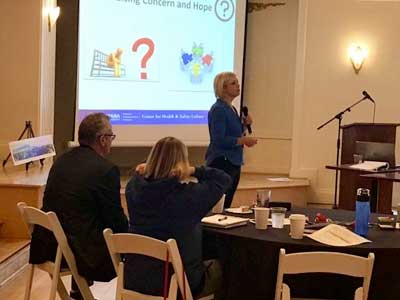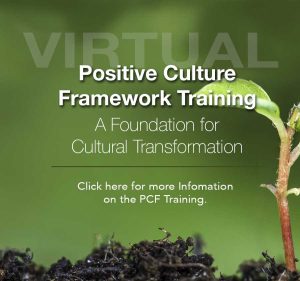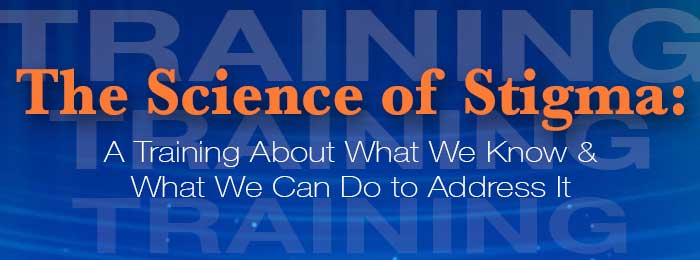
The Center offers several different training opportunities for those seeking to improve health and safety in their community or organization. The Positive Culture Framework Training provides a framework for attendees to organize their efforts. The framework includes a process for engaging in their work to improve health and safety; ways to grow three key skills -- leadership, communication, and integration of effective strategies; and the comprehensive context for doing their work (the social ecology) to sustain outcomes. The Center also provides a Science of Stigma training that helps attendees understand different types of stigma, how they’re manifested in our communities and organizations, and what we can do to address stigma to improve health and safety. Each is explained below. The Center hosts annual Positive Culture Framework Trainings and invites communities and/or organizations to host their own training.
- Positive Culture Framework Training
- Positive Culture Framework Skills Training
- Communication Skills
- Leadership Skills
- Integration Skills
- Stigma Training
View our complete YouTube PlayList on the Positive Culture Framework [ Here ]
Positive Culture Framework Training
The Positive Culture Framework (PCF) Training is an open training offered annually and often biannually. This event provides a foundation for efforts to improve health and safety that address a wide variety of complex social issues. Training attendees will:
- Learn how culture influences behavior
- Develop and refine skills in three critical areas: leadership, communication, and the integration of effective strategies
- Gain specific next steps for transforming culture to improve health and safety
We typically hold in-person trainings in different locations across the country, and in the past year we’ve also been offering virtual trainings that have proven effective as well.
To learn more about our next PCF Training opportunity, read about our upcoming Positive Culture Framework Training in Charlotte, North Carolina
Positive Culture Framework Skills Trainings
Skills trainings are more focused, specialized trainings for each of the three PCF skills to bolster implementation.
Communication Skills – Social Norms Marketing
One or Two-Day Training
The Positive Culture Framework (PCF) Communication Skills Training helps participants understand the underlying theory driving individual behavior and provides a seven-step process for developing effective communication. Individuals will learn best practices for the implementation of a social norms marketing campaign and tips on how to make prevention communication more powerful. Participants will leave the training with specific next steps to effectively communicate to improve health in their community. After completing the two-day training, you are eligible for guide service.
Leadership Skills
One-Day Training
The Positive Culture Framework Leadership (PCF) Skills Training provides participants an opportunity to grow and practice their leadership abilities. The training focuses on three specific areas of prevention leadership: raising concern about the issue being addressed while providing hope that change is possible; shifting the focus of prevention from changing an individual, to one where change is taking place across the systems in a community to create transformation; and, how to create environments where people choose healthier and safer behaviors for themselves. Prevention practitioners are leaders in both communities and organizations. Leaders cannot force others to change behaviors; however, they can create conditions in which behavior change is more likely.
Integration Skills
One-Day Training
The Positive Culture Framework (PCF) Integration Skills Training provides prevention coordinators an opportunity and the tools to map their current prevention strategies in a way that reveals gaps in services and systems, as well as, provide tips on how to align and leverage prevention strategies for greater impact. Health and safety issues are very complex, and there are no simple solutions to issues like substance abuse, traffic safety or violence. No single strategy that can successfully address these issues; it takes a variety of strategies to create change. The integration, or alignment of prevention strategies within an organization or a community is critical.
Stigma Training
This training is for anyone working in the field of health and safety that would like to understand how stigma is associated with a variety of negative social and health outcomes; why certain conditions and issues become stigmatized; how stigma is a barrier to progress on social issues in the fields of public health, prevention, mental health, and substance misuse; and how stigma can be reduced to better serve our communities.
Stigma training provides a foundation for recognizing how stigma impacts efforts to improve health and safety. Training attendees will:
- Recognize the impact of stigma on important health and social issues like the misuse of substances and mental health disorders
- Identify how stigma is manifested and factors that contribute to stigma
- Learn about ways to reduce stigma and be able to apply specific strategies to their work
In-person or virtual trainings are offered.
Continuing Education Credits are available to all attendees upon completion of the training.


